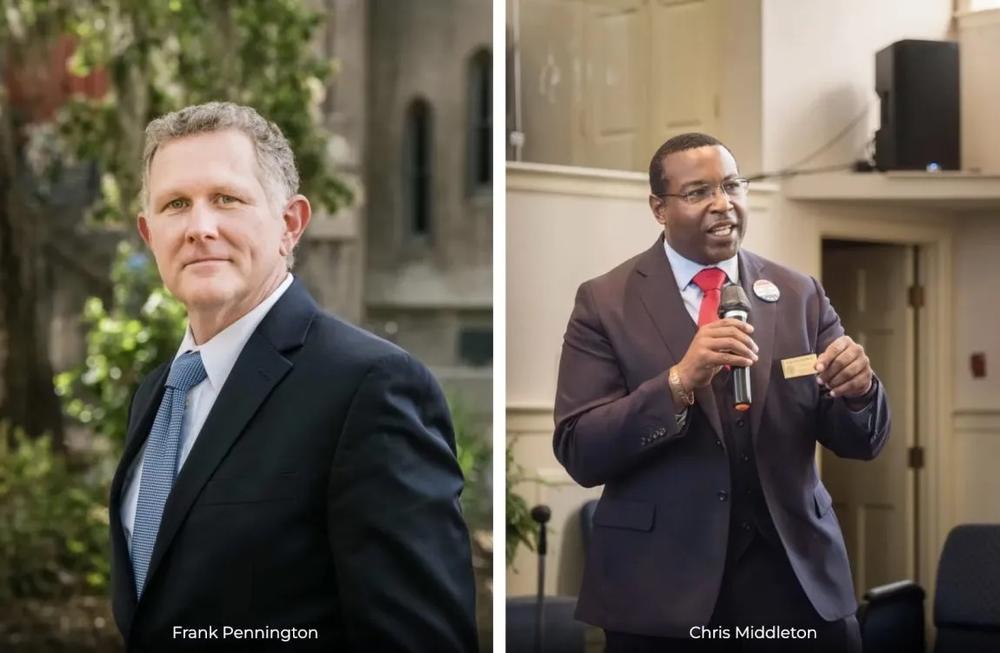
Caption
Frank Pennington (left) and Chris Middleton (right) are vying for the open judge's position in Chatham County Superior Court. The Current spoke with both men to get a sense of who they are.
Credit: Justin Taylor / The Current

Frank Pennington (left) and Chris Middleton (right) are vying for the open judge's position in Chatham County Superior Court. The Current spoke with both men to get a sense of who they are.
Jake Shore, The Current
One unlikely election in Chatham County receiving more attention than in past years and dividing community members is the race for Superior Court judge.
It’s nearly impossible to travel the county without seeing a sign for one of the two men running for the post, Chris Middleton and Frank Pennington. Between the two campaigns, over $130,000 has been spent on campaigning, travel and fundraising in the typically staid election, according to campaign finance records.
Despite their similar-sounding names, the two candidates could not present a more different choice to Chatham voters in the May 21 nonpartisan election. Pennington, born in Savannah, is a former sexual assault prosecutor with a passion for supporting victims; Middleton, born in Charleston, is a former public defender and temporary juvenile court judge. Another difference relevant amid conversations of race and representation: Pennington is white and Middleton is Black.
Both men believe they will administer equal justice if elevated to the Chatham County Superior Court Judge post being vacated by Judge Penny Freesemann. Unlike other elections taking place on May 21, theirs will be decided on that date because it is a nonpartisan race.
Superior Court judges handle all felony cases, custody disputes, zoning appeals, invasive warrant requests by police (see our guide for a full definition of the influential position). Moreover, they see all of society’s ills walk through their courtrooms; these judges give prison sentences for the most heinous local crimes and are also tasked with protecting the constitutional rights of all who enter the courthouse.
Candidates for judicial office are bound by the state’s code of judicial conduct, which restricts them from discussing issues that may come before their court and from being overtly partisan. It has made it difficult for journalists, citizens and the candidates themselves to explain their positions like other politicians can.
Before the election, The Current consulted a sitting-Superior Court judge (who is not facing a challenger) about the best way to discern judicial candidates from one another. The judge said that voters will be most equipped to pick a judge once they get to know them as people. This article attempts to highlight those character differences.
Middleton’s most impactful experience involving a judge came at an early age.
He grew up in the projects of Charleston. His younger brother, who has a disability, was often bullied. One day, Middleton came across his brother being jumped by three other kids, and he leaped into the fight to defend him. The action landed Middleton before a juvenile court judge, he said.
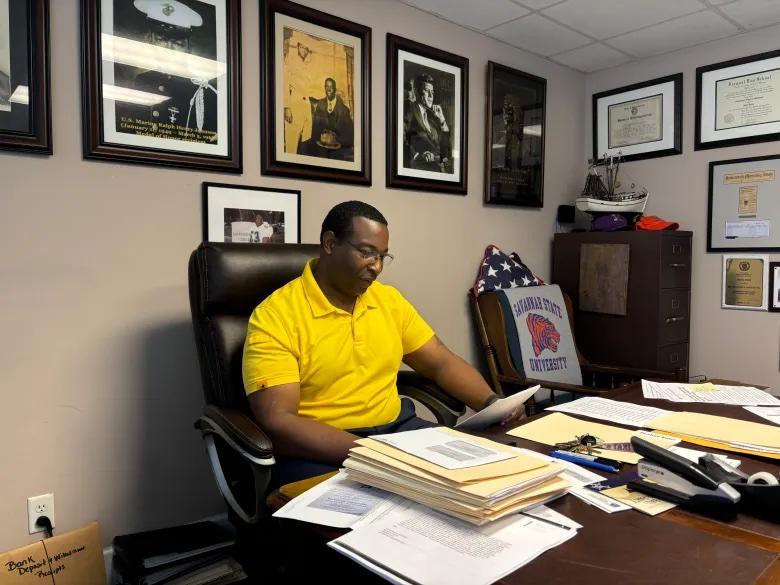
Chris Middleton speaking with The Current in his office. He has framed photos of his legal and personal heroes: former U.S. President John F. Kennedy, Rev. Martin Luther King Jr., and his uncle, Ralph Johnson, who earned the Medal of Honor.
“I told the judge what happened and the judge leaned over and said, ‘I’m the oldest of five, I understand,’” Middleton said. “He dismissed my case.”
That simple act of compassion and understanding, is something Middleton says he wants to put back into his own community as he seeks to become a Chatham County Superior Court judge.
The bespectacled man with short cropped hair, large shoulders and a rich voice, now 47 years old, said his life’s trajectory was further shifted by the time he reached the fifth grade. His mother, who worked three jobs in a single parent household, decided they needed to take care of Middleton’s grandmother, Susan, living in a rural Gullah community called Moncks Corner.
Middleton traded nights pierced with police sirens and gunshots to roosters crowing. Living there meant learning to grow crops and respect your elders, he said. In addition to teaching Middleton about family history, ethics, and religion, his grandmother imparted practical skills onto him.
“She taught me how to stitch. (We) made patchwork quilts together. She taught me how to fish. She taught me how to farm,” Middleton said. “She told me about all of the different properties that each plant, each vegetable has.”
He graduated from Berkeley High School and went to Savannah State University on a football scholarship. Coming from rural Moncks Corner to Savannah felt like entering an entirely new world, Middleton said, and he wanted to experience all the city had to offer.
As a freshman, he volunteered at a nursing home near the university. He participated in a local mentorship program. He joined the Omega Psi Phi fraternity. Middleton was voted in by the student body as the Student Government Association Chief Justice, a role he still looks back fondly on. He oversaw disciplinary hearings on campus involving students.
“The student body voted me into that position because I was relatable. I wasn’t a prep kid. I wasn’t a jock kid,” Middleton said. “I just had the respect of the students on campus, and they knew that I would be fair.”
After college Middleton was convinced he would be drafted into the NFL, and when he wasn’t, he looked for new dreams. He briefly worked at WSAV, before getting a call on September 10, 2002, from then-Savannah Mayor Floyd Adams via referral from a Savannah State professor. Adams needed a speechwriter, and his test for Middleton was to write a 9/11 speech Floyd would be giving the next day at the Savannah College of Art and Design.
Middleton worked furiously all night to deliver a speech to Adams. It went well, Middleton said, and he started work on the 12th as an assistant to the mayor. After a year working for Adams, Middleton confessed he wanted to be a politician, too, and the mayor said he should start by going to law school.
Middleton attended Vermont Law School and soon found himself interning at the public defender’s office in Berkeley County, S.C. What Middleton saw there hit him like a lightning bolt — people who needed a zealous legal advocate.
“I’d just never seen a need like that up close and personal,” Middleton said. “Someone is just saying ‘I need help, can you help me, please?’ in a very genuine, authentic way. It blew my mind.”
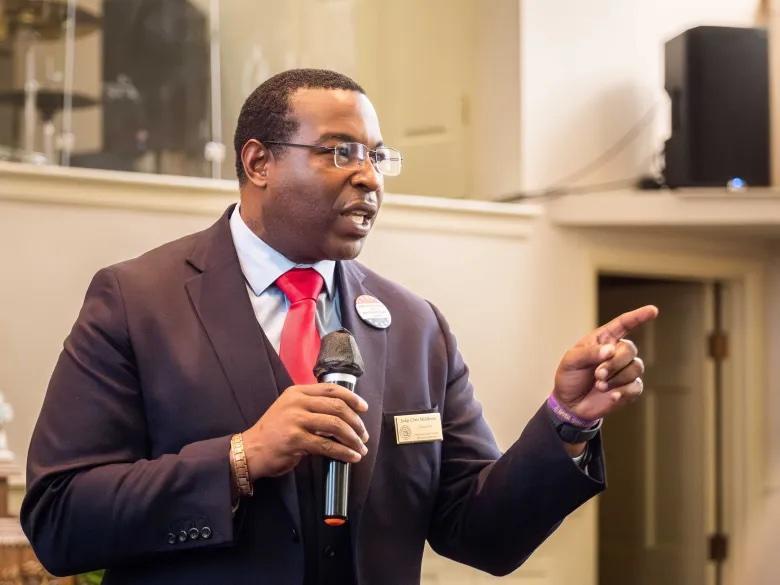
Chris Middleton speaking at an NAACP forum in his bid for Superior Court judge.
He began to represent indigent clients at his law school’s legal clinic, handling everything from people charged with criminal offenses to landlord-tenant disputes. After graduating, he came back to Savannah to work for the Chatham County Public Defender’s office under Michael Edwards. He started as a paralegal and worked his way up through the office.
Middleton said he learned first-hand about the heavy load public defenders carry by witnessing the pain and suffering that is part and parcel of the criminal justice system. But he said he also developed a profound “respect for the process” of defending people, no matter their income status.
Middleton eventually served as interim chief for Chatham’s public defender office before becoming a managing partner at a law firm. He was also appointed as a pro-tem (temporary) juvenile court judge in the county.
According to Middleton, his experiences growing up poor gives him the necessary insight to be a compassionate judge in Chatham County, where 15% of residents live in poverty, according to census data.
“I’m going to have a little more empathy in regards to people’s stations in life based on my own experience,” Middleton said. “You just got to treat people with respect because you never know what burdens they bring into that courtroom.”
To prepare himself for this office, Middleton said he has tried to learn from every current judge’s superpower: Judge Michael Karpf’s patience, Judge Timothy Wallamsley’s forthrightness, Judge Louisa Abbott’s compassion.
Outside of law, Middleton said Sundays hold a special place in his week. Not for football, but for himself to recharge. Middleton says that his primary church is Temple of Glory Community Church but that he also visits his friends in the clergy at First African Baptist and St. Paul’s. He spends time with his friends and his three dogs — Sky, Shaka, and their child, Sage. “That’s my family,” Middleton said.
He’s a bachelor: a product of years spent working cases with little regard to his personal life, he said. But Middleton said he has since learned to better manage himself and others. Middleton said he paints and writes poetry to de-stress, as well as doing some minor carpentry. He also grows fruit trees from saplings to give to neighbors and friends.
Born in Savannah, Pennington said his life and career have been indelibly marked by impactful, driven women. The first was his mother, one of the first female police officers in the county and later the Thunderbolt Police Department’s first woman chief. As a result, Pennington’s impressions of law enforcement and justice were shaped at an early age.
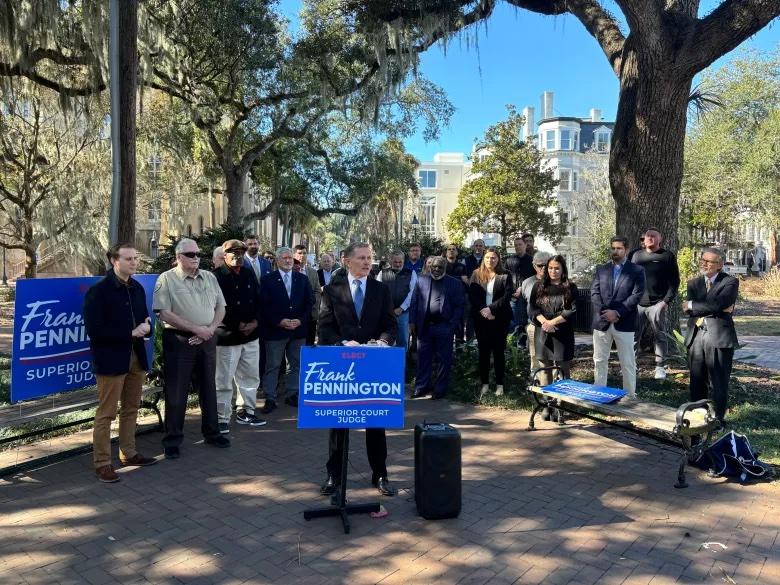
Frank Pennington flanked by supporters at his campaign announcement event in January 2024.
“As a way to help us understand why she wasn’t at home, she would tell us how she felt about the job, and how she felt that she was doing good by the work and doing good by helping the people she worked with,” Pennington said.
The silver-haired lawyer, now 47, with bright blue eyes said he spent a lot of time at the YMCA on Habersham Street “as a latchkey kid” while his parents worked. Pennington volunteered at YMCA summer camps, coached soccer and played for his high school’s soccer team at Herschel V. Jenkins.
Pennington said he remembers threatening to leave Savannah only once. He was 17 years old at the time and driving with his mother to Tybee Island. Unconvinced that Pennington would ever truly leave, his mother told him, “Honey, you’ve got saltwater in your veins.”
Pennington went on to Berry College in Rome, Ga., where he said he became determined to go to law school, try cases involving violent offenses, and serve crime victims — inspired by his mother’s work.
At Berry he came into contact with Julia Perilla, the Colombian-born mother of his best friend, who had a profound impact on how he saw prosecution and crime victims. Perilla, a faculty member at Georgia State University and appointee to the Georgia Commission on Family Violence, founded Caminar Latino which is the state’s “first and only comprehensive domestic violence intervention program for Latino families.”
Perilla taught Pennington, both informally and in the classroom, how trauma doesn’t just impact victims; it spreads to families and the greater community. She taught him “what it meant to be culturally relevant and thoughtful” when handling cases involving Latino communities, he said.
After attending and graduating from Georgia State for law school, Pennington was hired to work for former Chatham County District Attorney Spencer Lawton in 2006. He prosecuted misdemeanor cases but “pretty quickly” moved up to felonies and later went on to prosecute Special Victims Unit cases. The unit employs attorneys who are specially trained and only prosecute cases of sexual assault, child abuse, elder abuse and intimate partner violence.
Pennington helped write the manual for collaborations in prosecution and law enforcement in sexual assault crimes, known as the Sexual Assault Response Team manual. He left the Chatham County DA’s office in 2018 to go work as a federal prosecutor for the U.S. Attorney’s Office of the Southern District of Georgia, where he is still employed as he seeks to become a county judge.
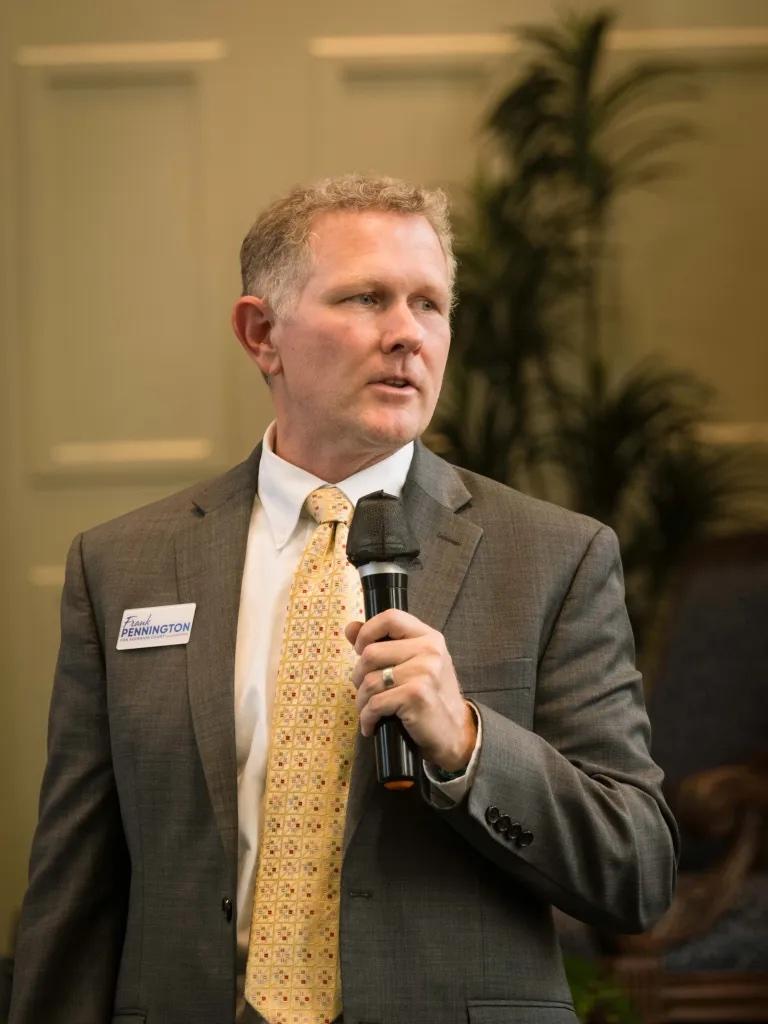
Frank Pennington speaking at an NAACP forum in May 2024.
Asked how he would be able to empathize with those that come before his courtroom — residents struggling with addiction, poverty and mental health — Pennington said he has lost close friends to opioid addiction.
“I don’t live in a glass bubble. I never have,” he said.
It’s important to understand, according to Pennington, when a person struggling with addiction needs an opportunity, rather than punishment through the criminal justice system.
“There’s a difference between somebody, perhaps, who’s suffering from addiction and someone who engages in crime,” Pennington said.
Despite his solely prosecutorial background, Pennington said he has checks on a completely prosecutor-mindset. First, he’s married to a defense lawyer, Mandy Roberts, he said. Second, being considerate of the other side was baked into his experience as a prosecutor. Once a week while on his way to work, Pennington stopped in at the Savannah Police Department headquarters to advise detectives on whether they had enough evidence to go after certain SVU cases.
“I’m sensitive to the fact that people say, ‘You’re a prosecutor, right? You put people away?’” Pennington said. “The reality is I’ve kept a lot of people from scrutiny because I decided there wasn’t enough evidence.” As a judge, Pennington claims that key decisions he makes regarding evidence will be more respected and valued because he has the experience to back it up.
Outside of law, Pennington plays and coaches soccer, namely with the Savannah United soccer club. He has two children: Tegan, 9, and Grayson, 12.
Pennington said his family has a small Yorkie mix dog named Bentley. “I like him all right,” Pennington said, of the adopted dog. He is more of a big dog owner and misses his dog from college, named Eli.
He said he keeps a pretty solidly non-lawyer circle of friends through soccer and growing up in Savannah. His church is Wesley Monumental United Methodist Church next to Taylor Square.
This story comes to GPB through a reporting partnership with The Current.